Exploring Professional Values and Research in Mental Health Nursing
VerifiedAdded on 2022/12/28
|11
|3326
|87
Report
AI Summary
This report explores the development of professional values within mental health nursing, emphasizing the importance of integrity, dignity, justice, and respect in patient care. It presents two research studies related to dementia: a qualitative study comparing the views of people with dementia and their family carers regarding end-of-life care, and a quantitative study assessing the impact of group music intervention on anxiety and agitation in institutionalized older adults with dementia. The report critically discusses the research findings, addressing their relevance to clinical settings, the policies and guidelines that support the research, the effect of the findings on patient care, barriers to implementation, and legal and ethical considerations. The qualitative study highlights the significance of skilled care teams, comfort care, and person-centered approaches, while the quantitative study demonstrates the benefits of music intervention as a cost-effective method for managing anxiety. The report concludes by emphasizing the importance of integrating research into clinical practice to improve the quality of care and patient outcomes. The assignment is contributed by a student to be published on the website Desklib. Desklib is a platform which provides all the necessary AI based study tools for students.
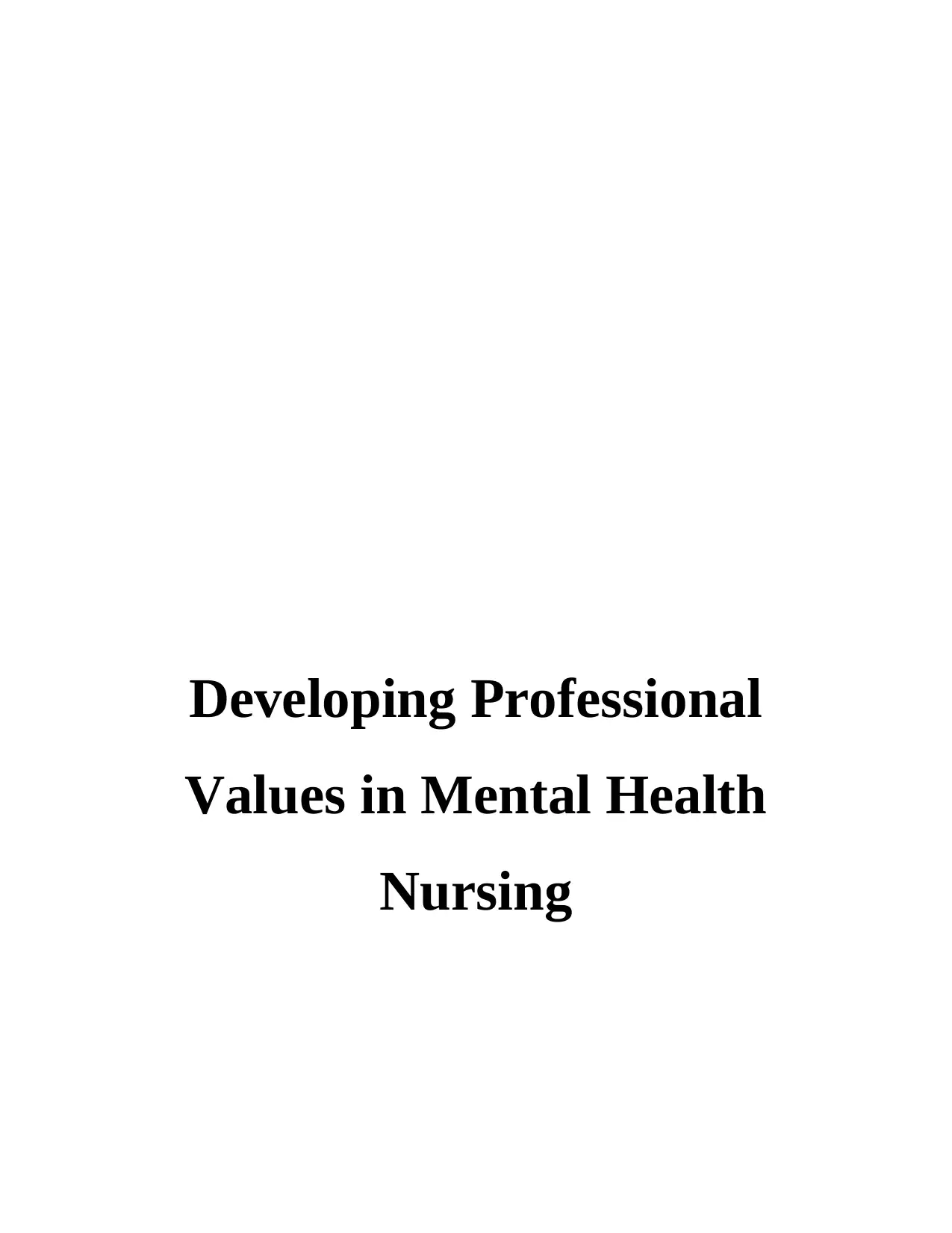
Developing Professional
Values in Mental Health
Nursing
Values in Mental Health
Nursing
Paraphrase This Document
Need a fresh take? Get an instant paraphrase of this document with our AI Paraphraser
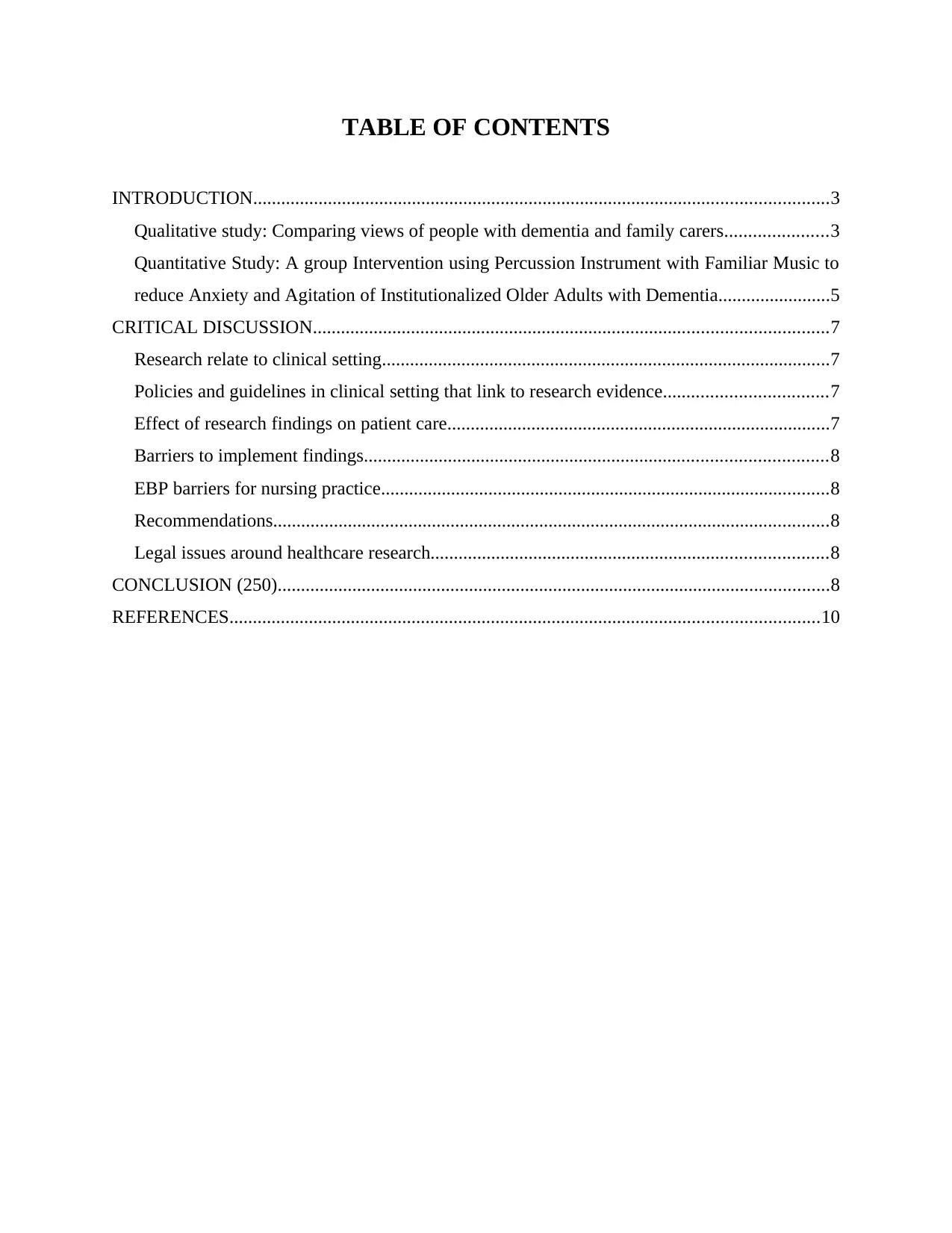
TABLE OF CONTENTS
INTRODUCTION...........................................................................................................................3
Qualitative study: Comparing views of people with dementia and family carers......................3
Quantitative Study: A group Intervention using Percussion Instrument with Familiar Music to
reduce Anxiety and Agitation of Institutionalized Older Adults with Dementia........................5
CRITICAL DISCUSSION..............................................................................................................7
Research relate to clinical setting................................................................................................7
Policies and guidelines in clinical setting that link to research evidence...................................7
Effect of research findings on patient care..................................................................................7
Barriers to implement findings...................................................................................................8
EBP barriers for nursing practice................................................................................................8
Recommendations.......................................................................................................................8
Legal issues around healthcare research.....................................................................................8
CONCLUSION (250)......................................................................................................................8
REFERENCES..............................................................................................................................10
INTRODUCTION...........................................................................................................................3
Qualitative study: Comparing views of people with dementia and family carers......................3
Quantitative Study: A group Intervention using Percussion Instrument with Familiar Music to
reduce Anxiety and Agitation of Institutionalized Older Adults with Dementia........................5
CRITICAL DISCUSSION..............................................................................................................7
Research relate to clinical setting................................................................................................7
Policies and guidelines in clinical setting that link to research evidence...................................7
Effect of research findings on patient care..................................................................................7
Barriers to implement findings...................................................................................................8
EBP barriers for nursing practice................................................................................................8
Recommendations.......................................................................................................................8
Legal issues around healthcare research.....................................................................................8
CONCLUSION (250)......................................................................................................................8
REFERENCES..............................................................................................................................10
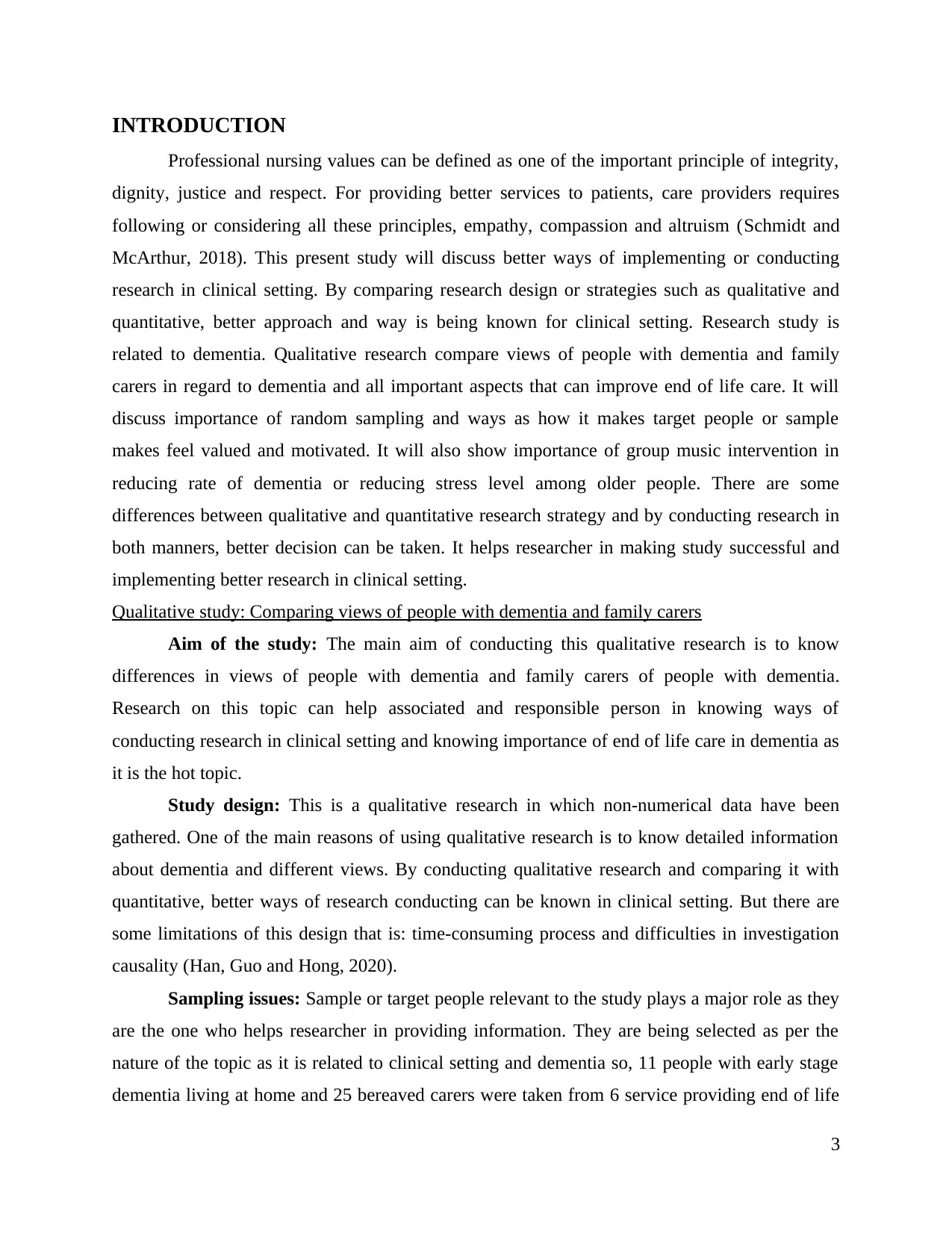
INTRODUCTION
Professional nursing values can be defined as one of the important principle of integrity,
dignity, justice and respect. For providing better services to patients, care providers requires
following or considering all these principles, empathy, compassion and altruism (Schmidt and
McArthur, 2018). This present study will discuss better ways of implementing or conducting
research in clinical setting. By comparing research design or strategies such as qualitative and
quantitative, better approach and way is being known for clinical setting. Research study is
related to dementia. Qualitative research compare views of people with dementia and family
carers in regard to dementia and all important aspects that can improve end of life care. It will
discuss importance of random sampling and ways as how it makes target people or sample
makes feel valued and motivated. It will also show importance of group music intervention in
reducing rate of dementia or reducing stress level among older people. There are some
differences between qualitative and quantitative research strategy and by conducting research in
both manners, better decision can be taken. It helps researcher in making study successful and
implementing better research in clinical setting.
Qualitative study: Comparing views of people with dementia and family carers
Aim of the study: The main aim of conducting this qualitative research is to know
differences in views of people with dementia and family carers of people with dementia.
Research on this topic can help associated and responsible person in knowing ways of
conducting research in clinical setting and knowing importance of end of life care in dementia as
it is the hot topic.
Study design: This is a qualitative research in which non-numerical data have been
gathered. One of the main reasons of using qualitative research is to know detailed information
about dementia and different views. By conducting qualitative research and comparing it with
quantitative, better ways of research conducting can be known in clinical setting. But there are
some limitations of this design that is: time-consuming process and difficulties in investigation
causality (Han, Guo and Hong, 2020).
Sampling issues: Sample or target people relevant to the study plays a major role as they
are the one who helps researcher in providing information. They are being selected as per the
nature of the topic as it is related to clinical setting and dementia so, 11 people with early stage
dementia living at home and 25 bereaved carers were taken from 6 service providing end of life
3
Professional nursing values can be defined as one of the important principle of integrity,
dignity, justice and respect. For providing better services to patients, care providers requires
following or considering all these principles, empathy, compassion and altruism (Schmidt and
McArthur, 2018). This present study will discuss better ways of implementing or conducting
research in clinical setting. By comparing research design or strategies such as qualitative and
quantitative, better approach and way is being known for clinical setting. Research study is
related to dementia. Qualitative research compare views of people with dementia and family
carers in regard to dementia and all important aspects that can improve end of life care. It will
discuss importance of random sampling and ways as how it makes target people or sample
makes feel valued and motivated. It will also show importance of group music intervention in
reducing rate of dementia or reducing stress level among older people. There are some
differences between qualitative and quantitative research strategy and by conducting research in
both manners, better decision can be taken. It helps researcher in making study successful and
implementing better research in clinical setting.
Qualitative study: Comparing views of people with dementia and family carers
Aim of the study: The main aim of conducting this qualitative research is to know
differences in views of people with dementia and family carers of people with dementia.
Research on this topic can help associated and responsible person in knowing ways of
conducting research in clinical setting and knowing importance of end of life care in dementia as
it is the hot topic.
Study design: This is a qualitative research in which non-numerical data have been
gathered. One of the main reasons of using qualitative research is to know detailed information
about dementia and different views. By conducting qualitative research and comparing it with
quantitative, better ways of research conducting can be known in clinical setting. But there are
some limitations of this design that is: time-consuming process and difficulties in investigation
causality (Han, Guo and Hong, 2020).
Sampling issues: Sample or target people relevant to the study plays a major role as they
are the one who helps researcher in providing information. They are being selected as per the
nature of the topic as it is related to clinical setting and dementia so, 11 people with early stage
dementia living at home and 25 bereaved carers were taken from 6 service providing end of life
3
⊘ This is a preview!⊘
Do you want full access?
Subscribe today to unlock all pages.

Trusted by 1+ million students worldwide
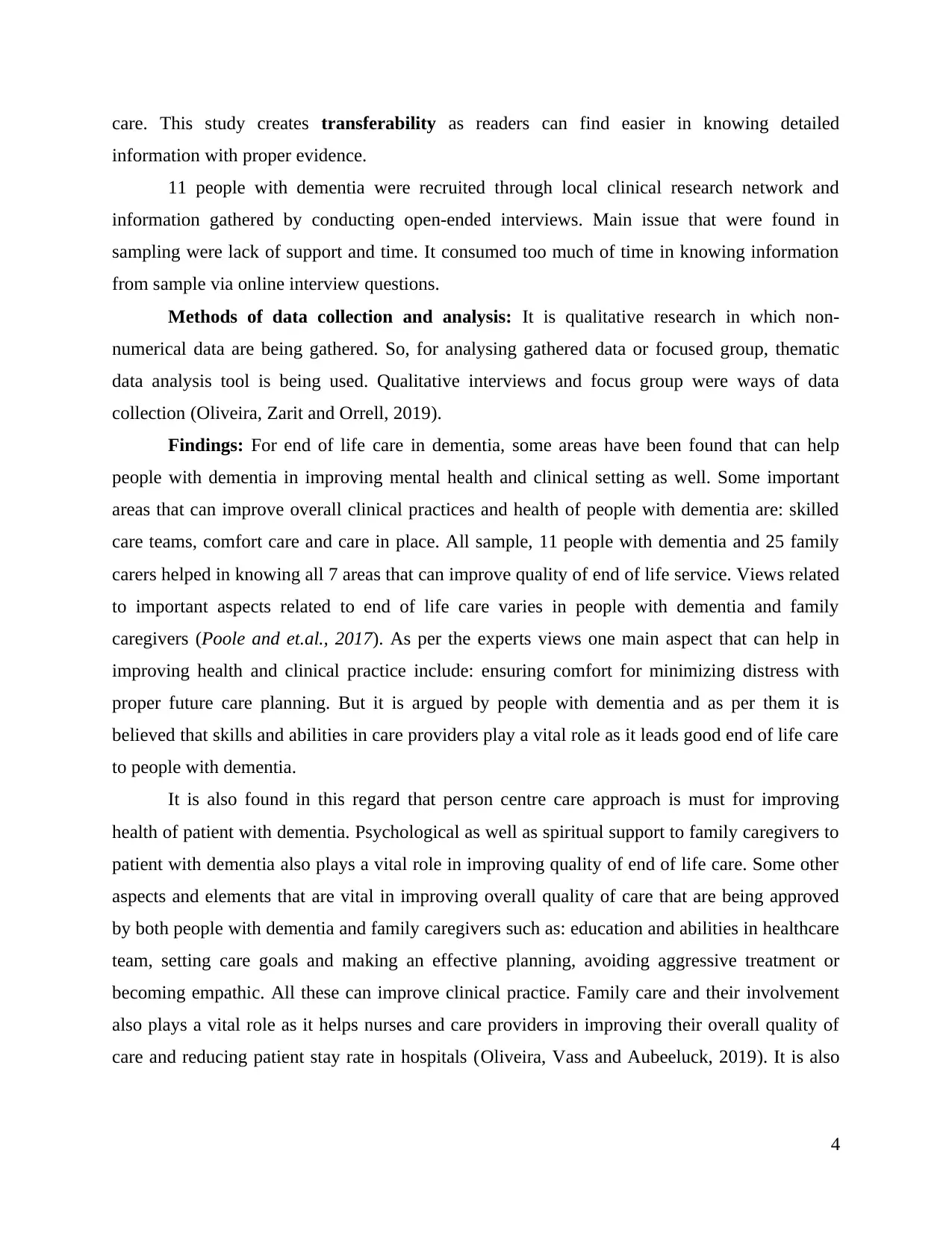
care. This study creates transferability as readers can find easier in knowing detailed
information with proper evidence.
11 people with dementia were recruited through local clinical research network and
information gathered by conducting open-ended interviews. Main issue that were found in
sampling were lack of support and time. It consumed too much of time in knowing information
from sample via online interview questions.
Methods of data collection and analysis: It is qualitative research in which non-
numerical data are being gathered. So, for analysing gathered data or focused group, thematic
data analysis tool is being used. Qualitative interviews and focus group were ways of data
collection (Oliveira, Zarit and Orrell, 2019).
Findings: For end of life care in dementia, some areas have been found that can help
people with dementia in improving mental health and clinical setting as well. Some important
areas that can improve overall clinical practices and health of people with dementia are: skilled
care teams, comfort care and care in place. All sample, 11 people with dementia and 25 family
carers helped in knowing all 7 areas that can improve quality of end of life service. Views related
to important aspects related to end of life care varies in people with dementia and family
caregivers (Poole and et.al., 2017). As per the experts views one main aspect that can help in
improving health and clinical practice include: ensuring comfort for minimizing distress with
proper future care planning. But it is argued by people with dementia and as per them it is
believed that skills and abilities in care providers play a vital role as it leads good end of life care
to people with dementia.
It is also found in this regard that person centre care approach is must for improving
health of patient with dementia. Psychological as well as spiritual support to family caregivers to
patient with dementia also plays a vital role in improving quality of end of life care. Some other
aspects and elements that are vital in improving overall quality of care that are being approved
by both people with dementia and family caregivers such as: education and abilities in healthcare
team, setting care goals and making an effective planning, avoiding aggressive treatment or
becoming empathic. All these can improve clinical practice. Family care and their involvement
also plays a vital role as it helps nurses and care providers in improving their overall quality of
care and reducing patient stay rate in hospitals (Oliveira, Vass and Aubeeluck, 2019). It is also
4
information with proper evidence.
11 people with dementia were recruited through local clinical research network and
information gathered by conducting open-ended interviews. Main issue that were found in
sampling were lack of support and time. It consumed too much of time in knowing information
from sample via online interview questions.
Methods of data collection and analysis: It is qualitative research in which non-
numerical data are being gathered. So, for analysing gathered data or focused group, thematic
data analysis tool is being used. Qualitative interviews and focus group were ways of data
collection (Oliveira, Zarit and Orrell, 2019).
Findings: For end of life care in dementia, some areas have been found that can help
people with dementia in improving mental health and clinical setting as well. Some important
areas that can improve overall clinical practices and health of people with dementia are: skilled
care teams, comfort care and care in place. All sample, 11 people with dementia and 25 family
carers helped in knowing all 7 areas that can improve quality of end of life service. Views related
to important aspects related to end of life care varies in people with dementia and family
caregivers (Poole and et.al., 2017). As per the experts views one main aspect that can help in
improving health and clinical practice include: ensuring comfort for minimizing distress with
proper future care planning. But it is argued by people with dementia and as per them it is
believed that skills and abilities in care providers play a vital role as it leads good end of life care
to people with dementia.
It is also found in this regard that person centre care approach is must for improving
health of patient with dementia. Psychological as well as spiritual support to family caregivers to
patient with dementia also plays a vital role in improving quality of end of life care. Some other
aspects and elements that are vital in improving overall quality of care that are being approved
by both people with dementia and family caregivers such as: education and abilities in healthcare
team, setting care goals and making an effective planning, avoiding aggressive treatment or
becoming empathic. All these can improve clinical practice. Family care and their involvement
also plays a vital role as it helps nurses and care providers in improving their overall quality of
care and reducing patient stay rate in hospitals (Oliveira, Vass and Aubeeluck, 2019). It is also
4
Paraphrase This Document
Need a fresh take? Get an instant paraphrase of this document with our AI Paraphraser
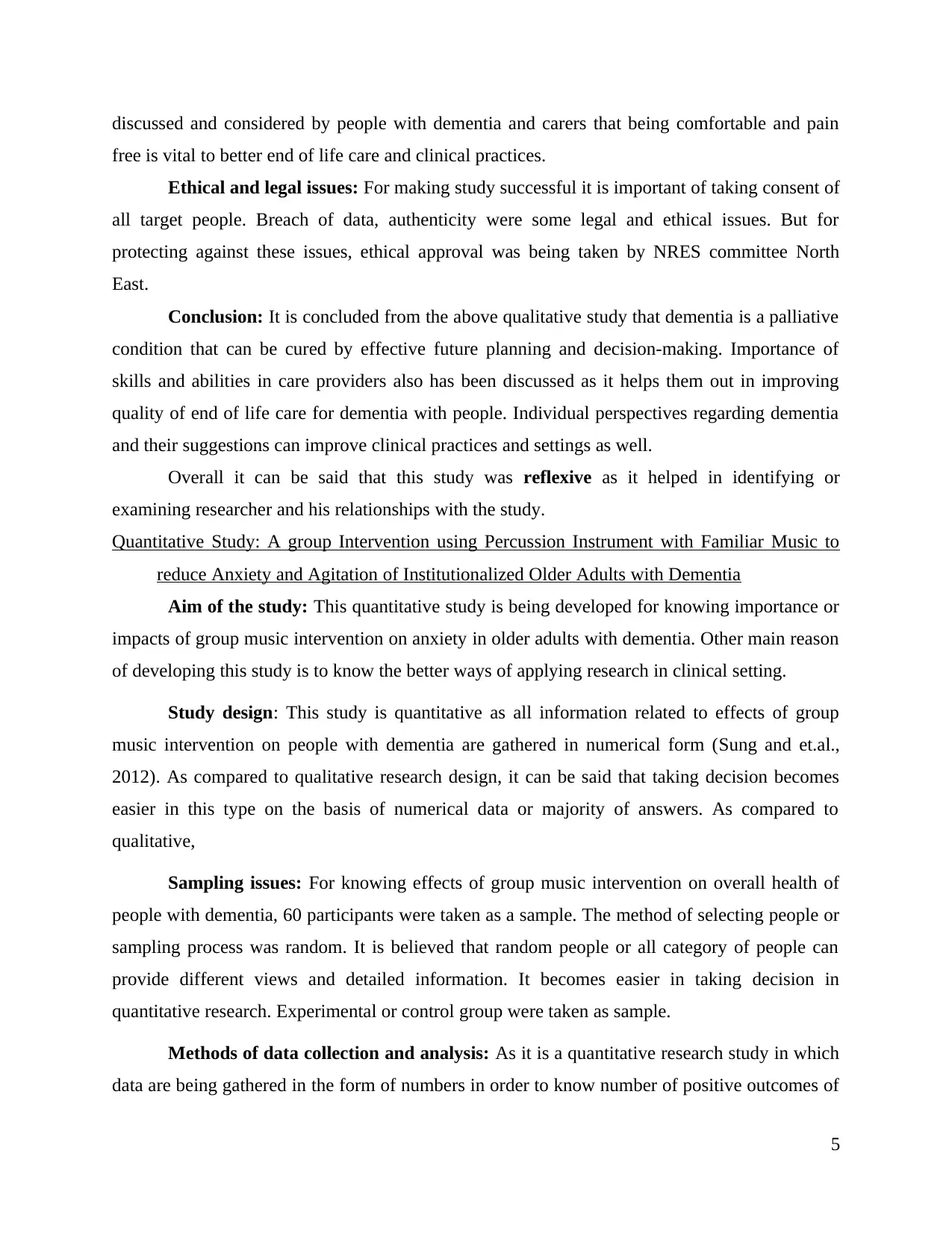
discussed and considered by people with dementia and carers that being comfortable and pain
free is vital to better end of life care and clinical practices.
Ethical and legal issues: For making study successful it is important of taking consent of
all target people. Breach of data, authenticity were some legal and ethical issues. But for
protecting against these issues, ethical approval was being taken by NRES committee North
East.
Conclusion: It is concluded from the above qualitative study that dementia is a palliative
condition that can be cured by effective future planning and decision-making. Importance of
skills and abilities in care providers also has been discussed as it helps them out in improving
quality of end of life care for dementia with people. Individual perspectives regarding dementia
and their suggestions can improve clinical practices and settings as well.
Overall it can be said that this study was reflexive as it helped in identifying or
examining researcher and his relationships with the study.
Quantitative Study: A group Intervention using Percussion Instrument with Familiar Music to
reduce Anxiety and Agitation of Institutionalized Older Adults with Dementia
Aim of the study: This quantitative study is being developed for knowing importance or
impacts of group music intervention on anxiety in older adults with dementia. Other main reason
of developing this study is to know the better ways of applying research in clinical setting.
Study design: This study is quantitative as all information related to effects of group
music intervention on people with dementia are gathered in numerical form (Sung and et.al.,
2012). As compared to qualitative research design, it can be said that taking decision becomes
easier in this type on the basis of numerical data or majority of answers. As compared to
qualitative,
Sampling issues: For knowing effects of group music intervention on overall health of
people with dementia, 60 participants were taken as a sample. The method of selecting people or
sampling process was random. It is believed that random people or all category of people can
provide different views and detailed information. It becomes easier in taking decision in
quantitative research. Experimental or control group were taken as sample.
Methods of data collection and analysis: As it is a quantitative research study in which
data are being gathered in the form of numbers in order to know number of positive outcomes of
5
free is vital to better end of life care and clinical practices.
Ethical and legal issues: For making study successful it is important of taking consent of
all target people. Breach of data, authenticity were some legal and ethical issues. But for
protecting against these issues, ethical approval was being taken by NRES committee North
East.
Conclusion: It is concluded from the above qualitative study that dementia is a palliative
condition that can be cured by effective future planning and decision-making. Importance of
skills and abilities in care providers also has been discussed as it helps them out in improving
quality of end of life care for dementia with people. Individual perspectives regarding dementia
and their suggestions can improve clinical practices and settings as well.
Overall it can be said that this study was reflexive as it helped in identifying or
examining researcher and his relationships with the study.
Quantitative Study: A group Intervention using Percussion Instrument with Familiar Music to
reduce Anxiety and Agitation of Institutionalized Older Adults with Dementia
Aim of the study: This quantitative study is being developed for knowing importance or
impacts of group music intervention on anxiety in older adults with dementia. Other main reason
of developing this study is to know the better ways of applying research in clinical setting.
Study design: This study is quantitative as all information related to effects of group
music intervention on people with dementia are gathered in numerical form (Sung and et.al.,
2012). As compared to qualitative research design, it can be said that taking decision becomes
easier in this type on the basis of numerical data or majority of answers. As compared to
qualitative,
Sampling issues: For knowing effects of group music intervention on overall health of
people with dementia, 60 participants were taken as a sample. The method of selecting people or
sampling process was random. It is believed that random people or all category of people can
provide different views and detailed information. It becomes easier in taking decision in
quantitative research. Experimental or control group were taken as sample.
Methods of data collection and analysis: As it is a quantitative research study in which
data are being gathered in the form of numbers in order to know number of positive outcomes of
5
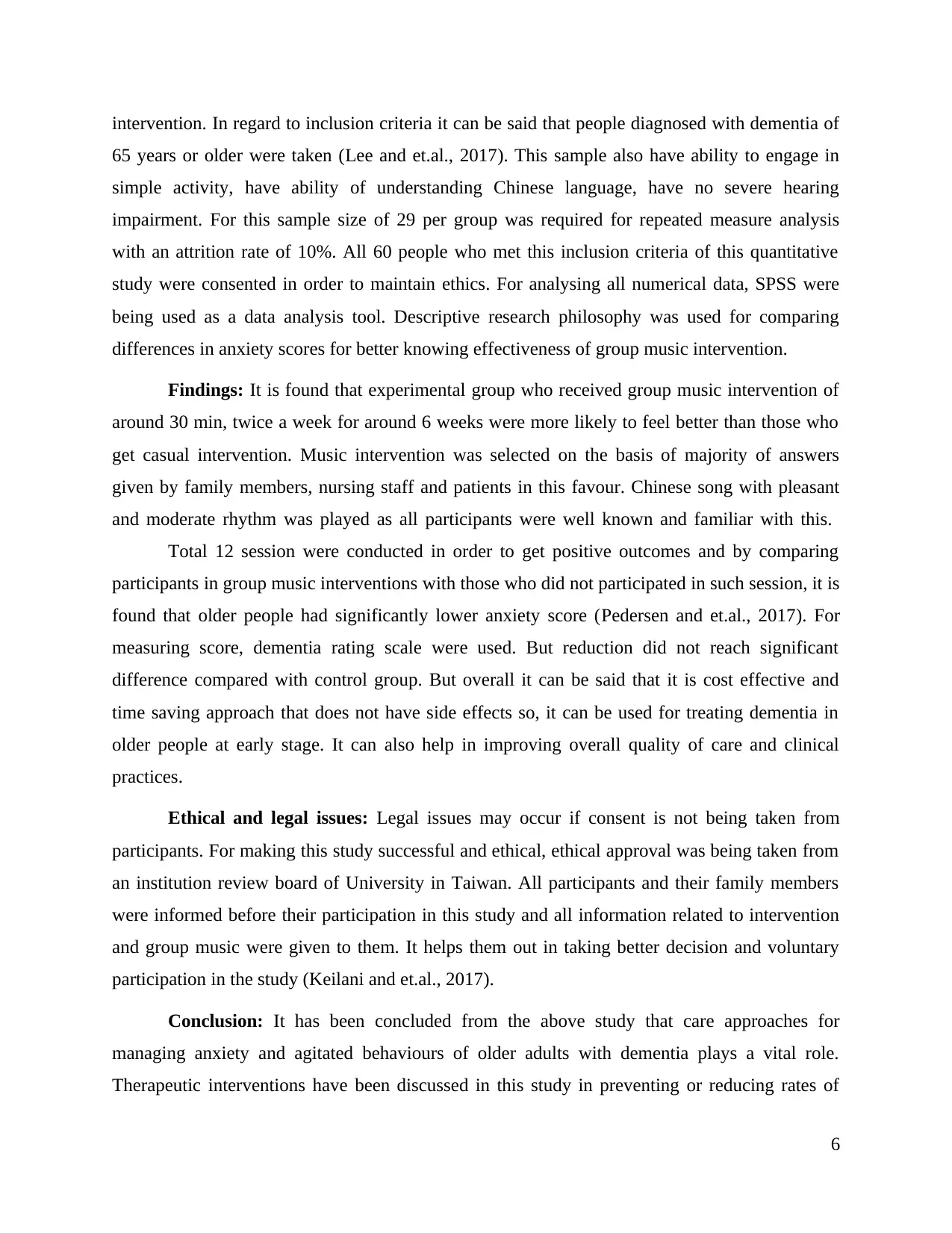
intervention. In regard to inclusion criteria it can be said that people diagnosed with dementia of
65 years or older were taken (Lee and et.al., 2017). This sample also have ability to engage in
simple activity, have ability of understanding Chinese language, have no severe hearing
impairment. For this sample size of 29 per group was required for repeated measure analysis
with an attrition rate of 10%. All 60 people who met this inclusion criteria of this quantitative
study were consented in order to maintain ethics. For analysing all numerical data, SPSS were
being used as a data analysis tool. Descriptive research philosophy was used for comparing
differences in anxiety scores for better knowing effectiveness of group music intervention.
Findings: It is found that experimental group who received group music intervention of
around 30 min, twice a week for around 6 weeks were more likely to feel better than those who
get casual intervention. Music intervention was selected on the basis of majority of answers
given by family members, nursing staff and patients in this favour. Chinese song with pleasant
and moderate rhythm was played as all participants were well known and familiar with this.
Total 12 session were conducted in order to get positive outcomes and by comparing
participants in group music interventions with those who did not participated in such session, it is
found that older people had significantly lower anxiety score (Pedersen and et.al., 2017). For
measuring score, dementia rating scale were used. But reduction did not reach significant
difference compared with control group. But overall it can be said that it is cost effective and
time saving approach that does not have side effects so, it can be used for treating dementia in
older people at early stage. It can also help in improving overall quality of care and clinical
practices.
Ethical and legal issues: Legal issues may occur if consent is not being taken from
participants. For making this study successful and ethical, ethical approval was being taken from
an institution review board of University in Taiwan. All participants and their family members
were informed before their participation in this study and all information related to intervention
and group music were given to them. It helps them out in taking better decision and voluntary
participation in the study (Keilani and et.al., 2017).
Conclusion: It has been concluded from the above study that care approaches for
managing anxiety and agitated behaviours of older adults with dementia plays a vital role.
Therapeutic interventions have been discussed in this study in preventing or reducing rates of
6
65 years or older were taken (Lee and et.al., 2017). This sample also have ability to engage in
simple activity, have ability of understanding Chinese language, have no severe hearing
impairment. For this sample size of 29 per group was required for repeated measure analysis
with an attrition rate of 10%. All 60 people who met this inclusion criteria of this quantitative
study were consented in order to maintain ethics. For analysing all numerical data, SPSS were
being used as a data analysis tool. Descriptive research philosophy was used for comparing
differences in anxiety scores for better knowing effectiveness of group music intervention.
Findings: It is found that experimental group who received group music intervention of
around 30 min, twice a week for around 6 weeks were more likely to feel better than those who
get casual intervention. Music intervention was selected on the basis of majority of answers
given by family members, nursing staff and patients in this favour. Chinese song with pleasant
and moderate rhythm was played as all participants were well known and familiar with this.
Total 12 session were conducted in order to get positive outcomes and by comparing
participants in group music interventions with those who did not participated in such session, it is
found that older people had significantly lower anxiety score (Pedersen and et.al., 2017). For
measuring score, dementia rating scale were used. But reduction did not reach significant
difference compared with control group. But overall it can be said that it is cost effective and
time saving approach that does not have side effects so, it can be used for treating dementia in
older people at early stage. It can also help in improving overall quality of care and clinical
practices.
Ethical and legal issues: Legal issues may occur if consent is not being taken from
participants. For making this study successful and ethical, ethical approval was being taken from
an institution review board of University in Taiwan. All participants and their family members
were informed before their participation in this study and all information related to intervention
and group music were given to them. It helps them out in taking better decision and voluntary
participation in the study (Keilani and et.al., 2017).
Conclusion: It has been concluded from the above study that care approaches for
managing anxiety and agitated behaviours of older adults with dementia plays a vital role.
Therapeutic interventions have been discussed in this study in preventing or reducing rates of
6
⊘ This is a preview!⊘
Do you want full access?
Subscribe today to unlock all pages.

Trusted by 1+ million students worldwide
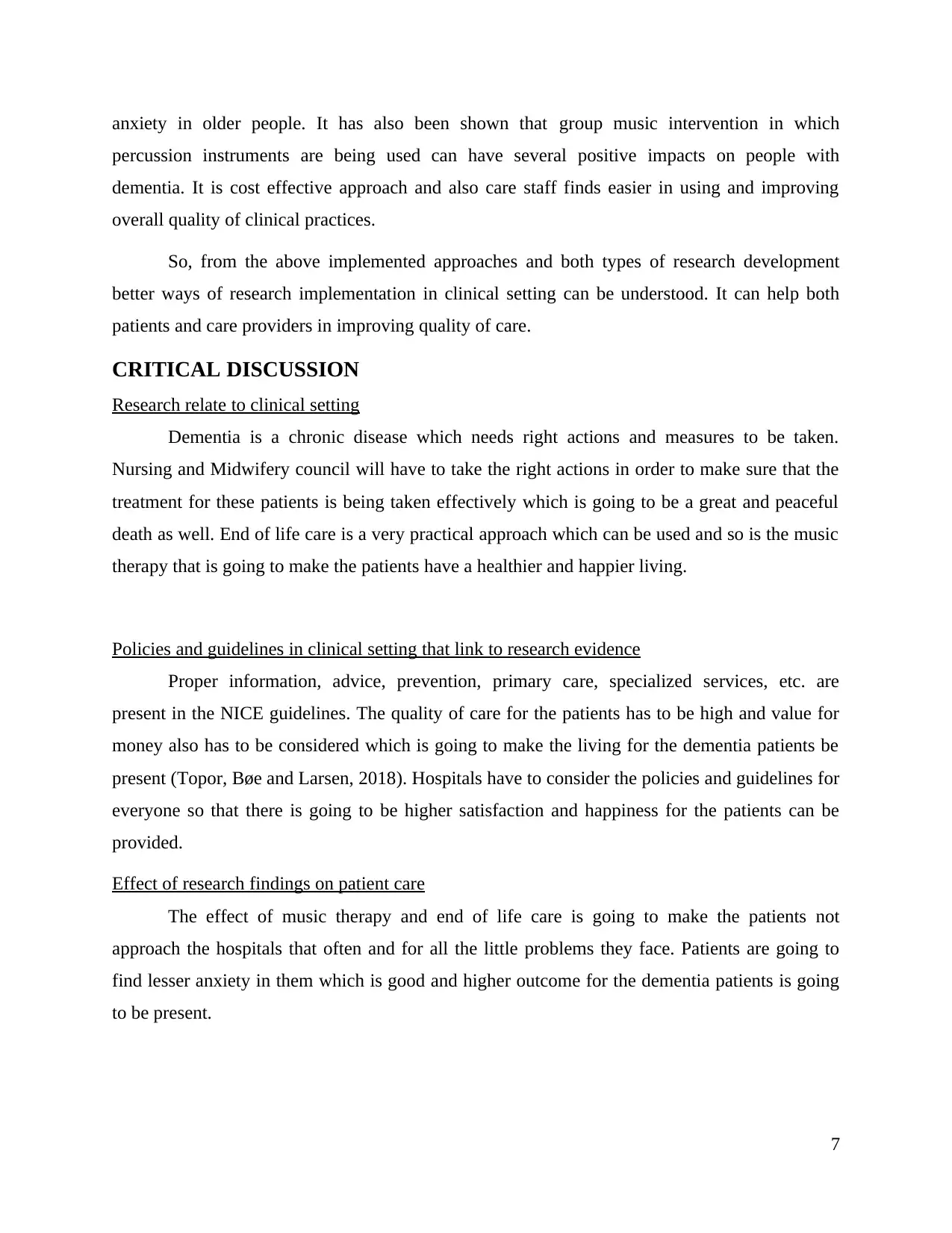
anxiety in older people. It has also been shown that group music intervention in which
percussion instruments are being used can have several positive impacts on people with
dementia. It is cost effective approach and also care staff finds easier in using and improving
overall quality of clinical practices.
So, from the above implemented approaches and both types of research development
better ways of research implementation in clinical setting can be understood. It can help both
patients and care providers in improving quality of care.
CRITICAL DISCUSSION
Research relate to clinical setting
Dementia is a chronic disease which needs right actions and measures to be taken.
Nursing and Midwifery council will have to take the right actions in order to make sure that the
treatment for these patients is being taken effectively which is going to be a great and peaceful
death as well. End of life care is a very practical approach which can be used and so is the music
therapy that is going to make the patients have a healthier and happier living.
Policies and guidelines in clinical setting that link to research evidence
Proper information, advice, prevention, primary care, specialized services, etc. are
present in the NICE guidelines. The quality of care for the patients has to be high and value for
money also has to be considered which is going to make the living for the dementia patients be
present (Topor, Bøe and Larsen, 2018). Hospitals have to consider the policies and guidelines for
everyone so that there is going to be higher satisfaction and happiness for the patients can be
provided.
Effect of research findings on patient care
The effect of music therapy and end of life care is going to make the patients not
approach the hospitals that often and for all the little problems they face. Patients are going to
find lesser anxiety in them which is good and higher outcome for the dementia patients is going
to be present.
7
percussion instruments are being used can have several positive impacts on people with
dementia. It is cost effective approach and also care staff finds easier in using and improving
overall quality of clinical practices.
So, from the above implemented approaches and both types of research development
better ways of research implementation in clinical setting can be understood. It can help both
patients and care providers in improving quality of care.
CRITICAL DISCUSSION
Research relate to clinical setting
Dementia is a chronic disease which needs right actions and measures to be taken.
Nursing and Midwifery council will have to take the right actions in order to make sure that the
treatment for these patients is being taken effectively which is going to be a great and peaceful
death as well. End of life care is a very practical approach which can be used and so is the music
therapy that is going to make the patients have a healthier and happier living.
Policies and guidelines in clinical setting that link to research evidence
Proper information, advice, prevention, primary care, specialized services, etc. are
present in the NICE guidelines. The quality of care for the patients has to be high and value for
money also has to be considered which is going to make the living for the dementia patients be
present (Topor, Bøe and Larsen, 2018). Hospitals have to consider the policies and guidelines for
everyone so that there is going to be higher satisfaction and happiness for the patients can be
provided.
Effect of research findings on patient care
The effect of music therapy and end of life care is going to make the patients not
approach the hospitals that often and for all the little problems they face. Patients are going to
find lesser anxiety in them which is good and higher outcome for the dementia patients is going
to be present.
7
Paraphrase This Document
Need a fresh take? Get an instant paraphrase of this document with our AI Paraphraser
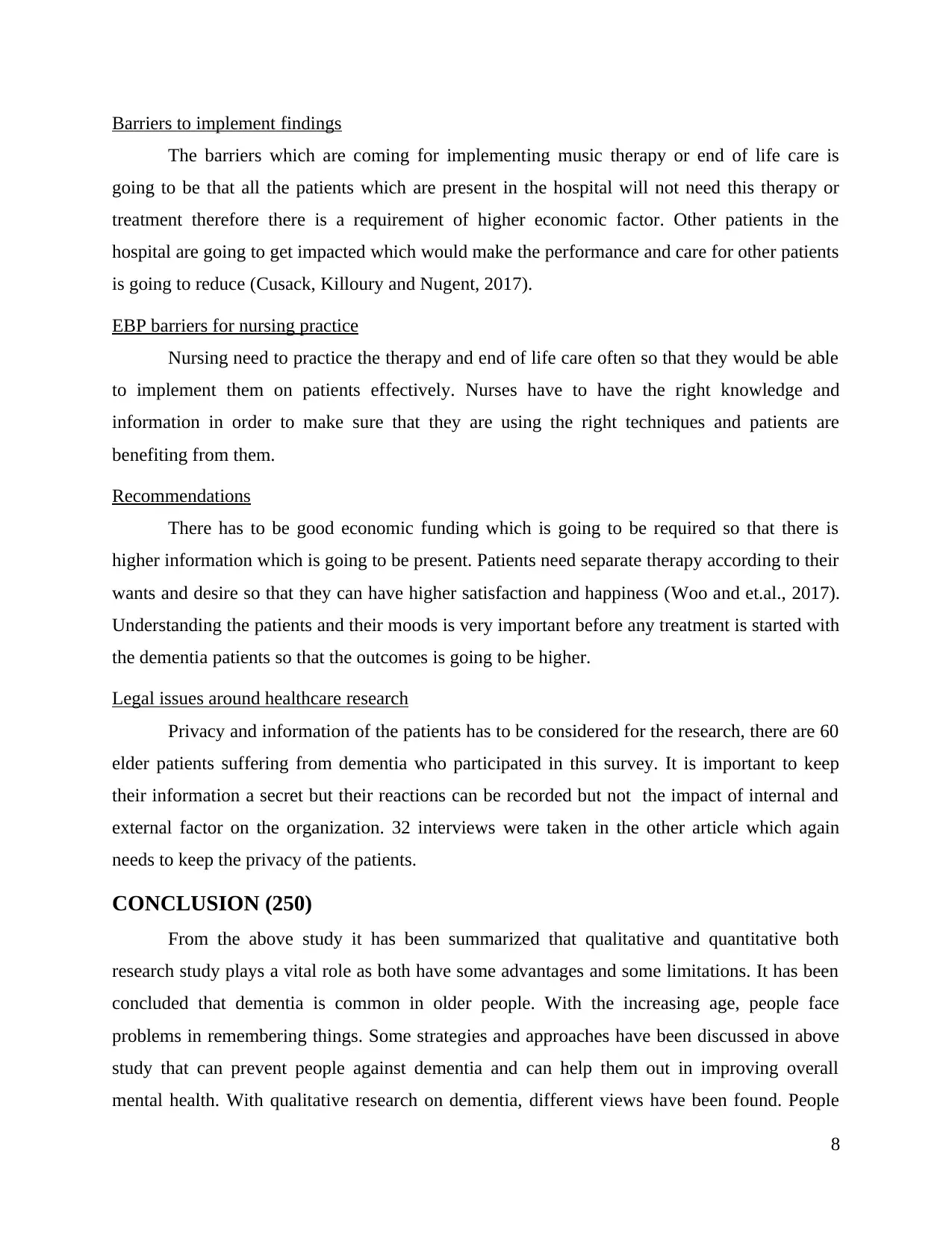
Barriers to implement findings
The barriers which are coming for implementing music therapy or end of life care is
going to be that all the patients which are present in the hospital will not need this therapy or
treatment therefore there is a requirement of higher economic factor. Other patients in the
hospital are going to get impacted which would make the performance and care for other patients
is going to reduce (Cusack, Killoury and Nugent, 2017).
EBP barriers for nursing practice
Nursing need to practice the therapy and end of life care often so that they would be able
to implement them on patients effectively. Nurses have to have the right knowledge and
information in order to make sure that they are using the right techniques and patients are
benefiting from them.
Recommendations
There has to be good economic funding which is going to be required so that there is
higher information which is going to be present. Patients need separate therapy according to their
wants and desire so that they can have higher satisfaction and happiness (Woo and et.al., 2017).
Understanding the patients and their moods is very important before any treatment is started with
the dementia patients so that the outcomes is going to be higher.
Legal issues around healthcare research
Privacy and information of the patients has to be considered for the research, there are 60
elder patients suffering from dementia who participated in this survey. It is important to keep
their information a secret but their reactions can be recorded but not the impact of internal and
external factor on the organization. 32 interviews were taken in the other article which again
needs to keep the privacy of the patients.
CONCLUSION (250)
From the above study it has been summarized that qualitative and quantitative both
research study plays a vital role as both have some advantages and some limitations. It has been
concluded that dementia is common in older people. With the increasing age, people face
problems in remembering things. Some strategies and approaches have been discussed in above
study that can prevent people against dementia and can help them out in improving overall
mental health. With qualitative research on dementia, different views have been found. People
8
The barriers which are coming for implementing music therapy or end of life care is
going to be that all the patients which are present in the hospital will not need this therapy or
treatment therefore there is a requirement of higher economic factor. Other patients in the
hospital are going to get impacted which would make the performance and care for other patients
is going to reduce (Cusack, Killoury and Nugent, 2017).
EBP barriers for nursing practice
Nursing need to practice the therapy and end of life care often so that they would be able
to implement them on patients effectively. Nurses have to have the right knowledge and
information in order to make sure that they are using the right techniques and patients are
benefiting from them.
Recommendations
There has to be good economic funding which is going to be required so that there is
higher information which is going to be present. Patients need separate therapy according to their
wants and desire so that they can have higher satisfaction and happiness (Woo and et.al., 2017).
Understanding the patients and their moods is very important before any treatment is started with
the dementia patients so that the outcomes is going to be higher.
Legal issues around healthcare research
Privacy and information of the patients has to be considered for the research, there are 60
elder patients suffering from dementia who participated in this survey. It is important to keep
their information a secret but their reactions can be recorded but not the impact of internal and
external factor on the organization. 32 interviews were taken in the other article which again
needs to keep the privacy of the patients.
CONCLUSION (250)
From the above study it has been summarized that qualitative and quantitative both
research study plays a vital role as both have some advantages and some limitations. It has been
concluded that dementia is common in older people. With the increasing age, people face
problems in remembering things. Some strategies and approaches have been discussed in above
study that can prevent people against dementia and can help them out in improving overall
mental health. With qualitative research on dementia, different views have been found. People
8
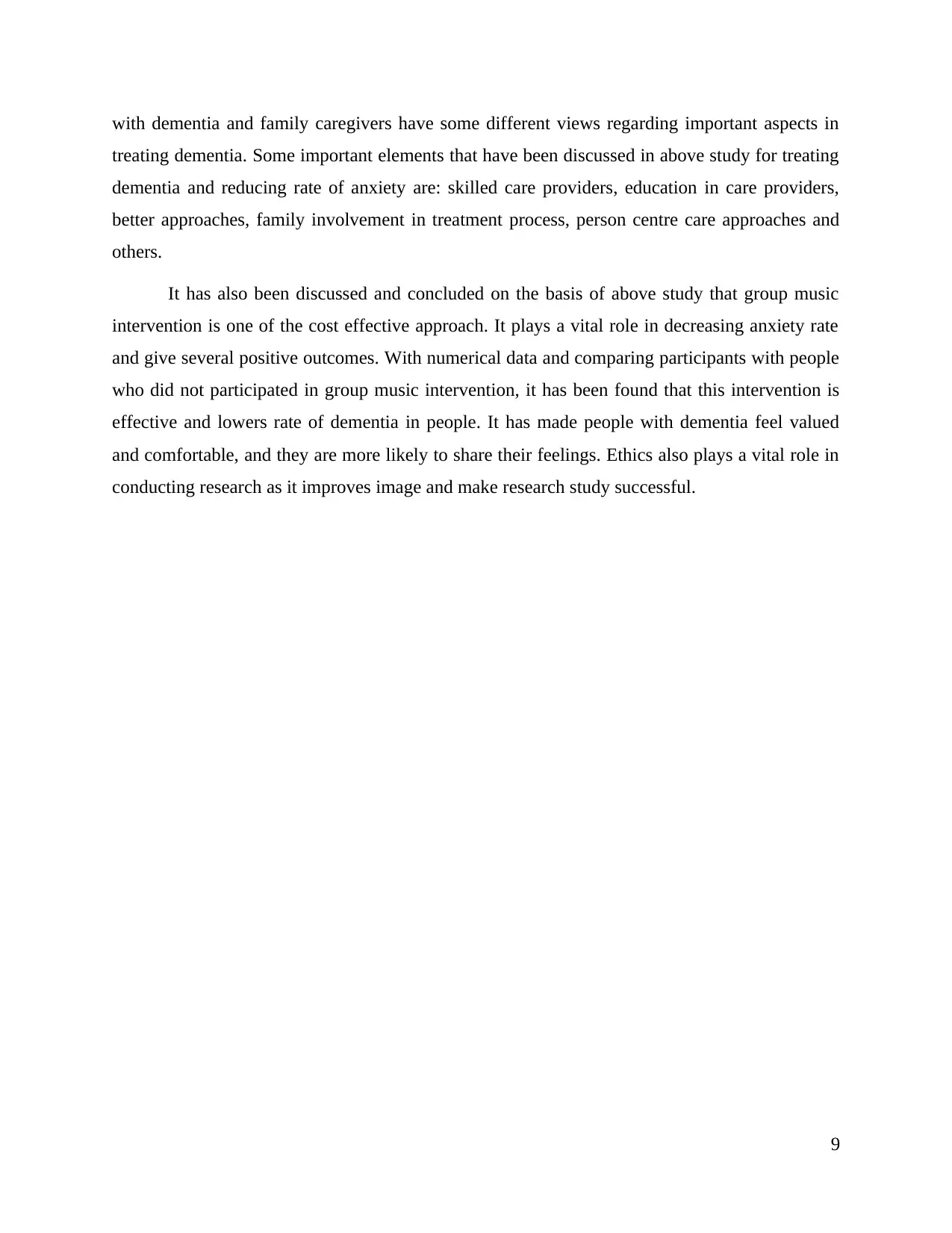
with dementia and family caregivers have some different views regarding important aspects in
treating dementia. Some important elements that have been discussed in above study for treating
dementia and reducing rate of anxiety are: skilled care providers, education in care providers,
better approaches, family involvement in treatment process, person centre care approaches and
others.
It has also been discussed and concluded on the basis of above study that group music
intervention is one of the cost effective approach. It plays a vital role in decreasing anxiety rate
and give several positive outcomes. With numerical data and comparing participants with people
who did not participated in group music intervention, it has been found that this intervention is
effective and lowers rate of dementia in people. It has made people with dementia feel valued
and comfortable, and they are more likely to share their feelings. Ethics also plays a vital role in
conducting research as it improves image and make research study successful.
9
treating dementia. Some important elements that have been discussed in above study for treating
dementia and reducing rate of anxiety are: skilled care providers, education in care providers,
better approaches, family involvement in treatment process, person centre care approaches and
others.
It has also been discussed and concluded on the basis of above study that group music
intervention is one of the cost effective approach. It plays a vital role in decreasing anxiety rate
and give several positive outcomes. With numerical data and comparing participants with people
who did not participated in group music intervention, it has been found that this intervention is
effective and lowers rate of dementia in people. It has made people with dementia feel valued
and comfortable, and they are more likely to share their feelings. Ethics also plays a vital role in
conducting research as it improves image and make research study successful.
9
⊘ This is a preview!⊘
Do you want full access?
Subscribe today to unlock all pages.

Trusted by 1+ million students worldwide
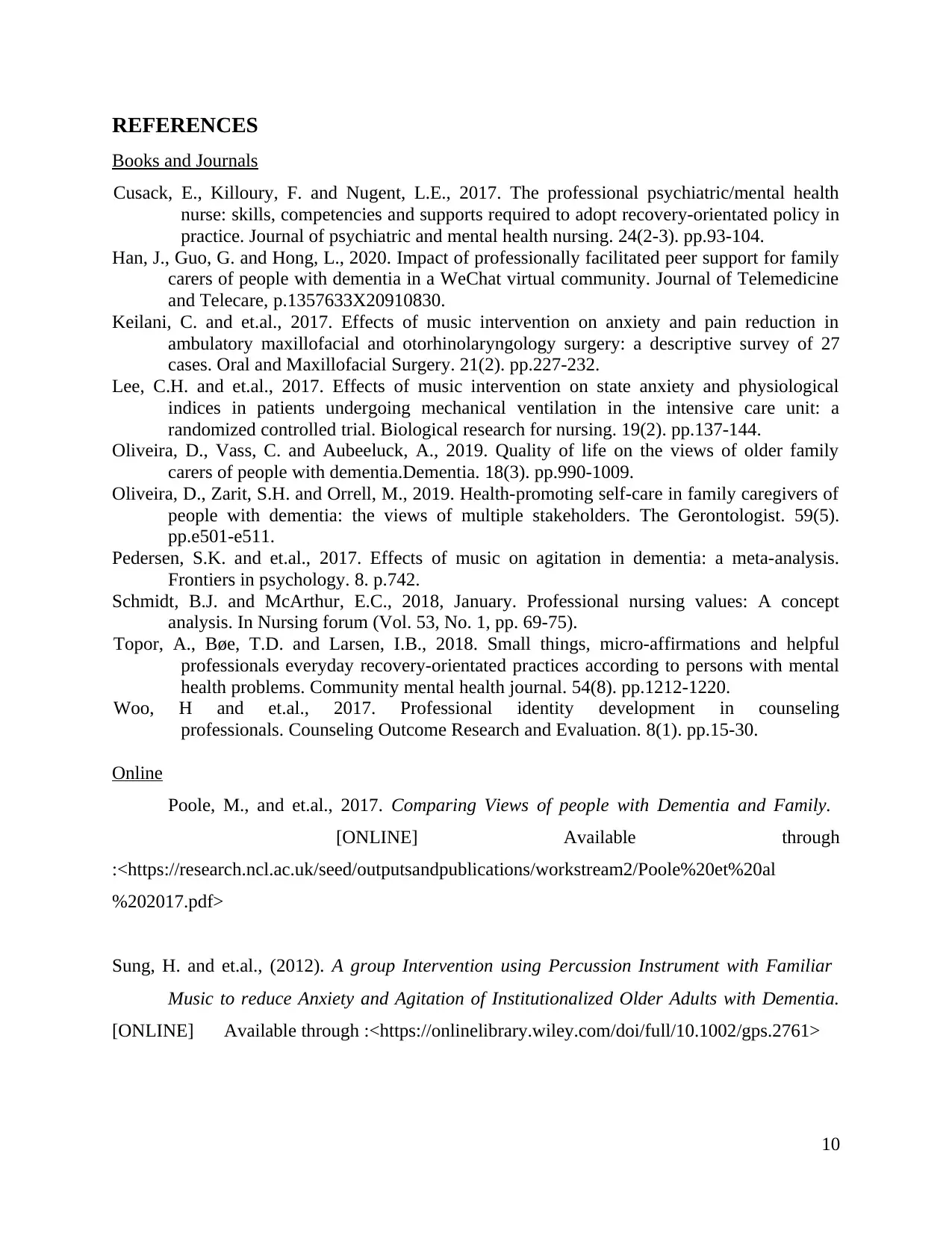
REFERENCES
Books and Journals
Cusack, E., Killoury, F. and Nugent, L.E., 2017. The professional psychiatric/mental health
nurse: skills, competencies and supports required to adopt recovery‐orientated policy in
practice. Journal of psychiatric and mental health nursing. 24(2-3). pp.93-104.
Han, J., Guo, G. and Hong, L., 2020. Impact of professionally facilitated peer support for family
carers of people with dementia in a WeChat virtual community. Journal of Telemedicine
and Telecare, p.1357633X20910830.
Keilani, C. and et.al., 2017. Effects of music intervention on anxiety and pain reduction in
ambulatory maxillofacial and otorhinolaryngology surgery: a descriptive survey of 27
cases. Oral and Maxillofacial Surgery. 21(2). pp.227-232.
Lee, C.H. and et.al., 2017. Effects of music intervention on state anxiety and physiological
indices in patients undergoing mechanical ventilation in the intensive care unit: a
randomized controlled trial. Biological research for nursing. 19(2). pp.137-144.
Oliveira, D., Vass, C. and Aubeeluck, A., 2019. Quality of life on the views of older family
carers of people with dementia.Dementia. 18(3). pp.990-1009.
Oliveira, D., Zarit, S.H. and Orrell, M., 2019. Health-promoting self-care in family caregivers of
people with dementia: the views of multiple stakeholders. The Gerontologist. 59(5).
pp.e501-e511.
Pedersen, S.K. and et.al., 2017. Effects of music on agitation in dementia: a meta-analysis.
Frontiers in psychology. 8. p.742.
Schmidt, B.J. and McArthur, E.C., 2018, January. Professional nursing values: A concept
analysis. In Nursing forum (Vol. 53, No. 1, pp. 69-75).
Topor, A., Bøe, T.D. and Larsen, I.B., 2018. Small things, micro-affirmations and helpful
professionals everyday recovery-orientated practices according to persons with mental
health problems. Community mental health journal. 54(8). pp.1212-1220.
Woo, H and et.al., 2017. Professional identity development in counseling
professionals. Counseling Outcome Research and Evaluation. 8(1). pp.15-30.
Online
Poole, M., and et.al., 2017. Comparing Views of people with Dementia and Family.
[ONLINE] Available through
:<https://research.ncl.ac.uk/seed/outputsandpublications/workstream2/Poole%20et%20al
%202017.pdf>
Sung, H. and et.al., (2012). A group Intervention using Percussion Instrument with Familiar
Music to reduce Anxiety and Agitation of Institutionalized Older Adults with Dementia.
[ONLINE] Available through :<https://onlinelibrary.wiley.com/doi/full/10.1002/gps.2761>
10
Books and Journals
Cusack, E., Killoury, F. and Nugent, L.E., 2017. The professional psychiatric/mental health
nurse: skills, competencies and supports required to adopt recovery‐orientated policy in
practice. Journal of psychiatric and mental health nursing. 24(2-3). pp.93-104.
Han, J., Guo, G. and Hong, L., 2020. Impact of professionally facilitated peer support for family
carers of people with dementia in a WeChat virtual community. Journal of Telemedicine
and Telecare, p.1357633X20910830.
Keilani, C. and et.al., 2017. Effects of music intervention on anxiety and pain reduction in
ambulatory maxillofacial and otorhinolaryngology surgery: a descriptive survey of 27
cases. Oral and Maxillofacial Surgery. 21(2). pp.227-232.
Lee, C.H. and et.al., 2017. Effects of music intervention on state anxiety and physiological
indices in patients undergoing mechanical ventilation in the intensive care unit: a
randomized controlled trial. Biological research for nursing. 19(2). pp.137-144.
Oliveira, D., Vass, C. and Aubeeluck, A., 2019. Quality of life on the views of older family
carers of people with dementia.Dementia. 18(3). pp.990-1009.
Oliveira, D., Zarit, S.H. and Orrell, M., 2019. Health-promoting self-care in family caregivers of
people with dementia: the views of multiple stakeholders. The Gerontologist. 59(5).
pp.e501-e511.
Pedersen, S.K. and et.al., 2017. Effects of music on agitation in dementia: a meta-analysis.
Frontiers in psychology. 8. p.742.
Schmidt, B.J. and McArthur, E.C., 2018, January. Professional nursing values: A concept
analysis. In Nursing forum (Vol. 53, No. 1, pp. 69-75).
Topor, A., Bøe, T.D. and Larsen, I.B., 2018. Small things, micro-affirmations and helpful
professionals everyday recovery-orientated practices according to persons with mental
health problems. Community mental health journal. 54(8). pp.1212-1220.
Woo, H and et.al., 2017. Professional identity development in counseling
professionals. Counseling Outcome Research and Evaluation. 8(1). pp.15-30.
Online
Poole, M., and et.al., 2017. Comparing Views of people with Dementia and Family.
[ONLINE] Available through
:<https://research.ncl.ac.uk/seed/outputsandpublications/workstream2/Poole%20et%20al
%202017.pdf>
Sung, H. and et.al., (2012). A group Intervention using Percussion Instrument with Familiar
Music to reduce Anxiety and Agitation of Institutionalized Older Adults with Dementia.
[ONLINE] Available through :<https://onlinelibrary.wiley.com/doi/full/10.1002/gps.2761>
10
Paraphrase This Document
Need a fresh take? Get an instant paraphrase of this document with our AI Paraphraser

11
1 out of 11
Related Documents
Your All-in-One AI-Powered Toolkit for Academic Success.
+13062052269
info@desklib.com
Available 24*7 on WhatsApp / Email
![[object Object]](/_next/static/media/star-bottom.7253800d.svg)
Unlock your academic potential
Copyright © 2020–2025 A2Z Services. All Rights Reserved. Developed and managed by ZUCOL.





